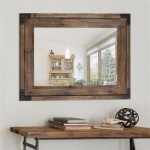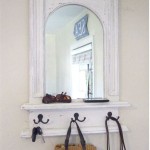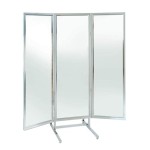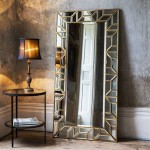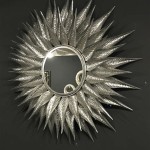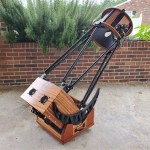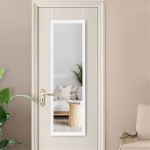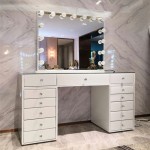Can You Have Two Mirrors In A Bedroom? Exploring the Practicality and Feng Shui Considerations
The question of whether one can have two mirrors in a bedroom is multifaceted, involving considerations of practicality, design aesthetics, and ancient belief systems like Feng Shui. There isn't a single, universally accepted answer. The suitability of having multiple mirrors hinges on individual circumstances, room layout, and personal beliefs.
From a purely pragmatic standpoint, multiple mirrors can be incredibly useful. They can amplify natural light, making a small room feel larger and more airy. They provide additional reflection surfaces for dressing and grooming, and can even serve as decorative elements, adding visual interest and depth to a space. However, without careful planning, the presence of numerous mirrors can lead to visual clutter, unwanted reflections, and potentially unsettling effects.
Beyond the practical, the inclusion of multiple mirrors within a bedroom often triggers discussion related to Feng Shui principles. This ancient practice emphasizes the harmonious arrangement of elements within a space to promote positive energy flow, known as "Chi." The placement, size, and orientation of mirrors are often subject to specific guidelines within this framework. Understanding these guidelines can help individuals make informed decisions about incorporating multiple mirrors into their bedroom design.
Practical Advantages and Disadvantages of Multiple Mirrors
The immediate benefits of incorporating several mirrors into a bedroom are primarily functional. Improved illumination is a significant advantage. Strategically positioned mirrors can bounce natural light from windows deeper into the room, reducing the need for artificial lighting during the day. This is particularly useful in bedrooms that receive limited sunlight or are located in darker areas of a home.
Furthermore, multiple mirrors can create the illusion of increased space. This is especially beneficial in smaller bedrooms where maximizing the perceived size is desirable. A large mirror on a wall, or mirrored closet doors, can effectively double the visual dimensions of the room. Adding a second mirror amplifies this effect, creating a greater sense of openness and airiness. The placement of these mirrors is crucial as a poorly positioned mirror can reflect clutter or create an undesirable visual duplication, counteracting the intended effect. A full-length mirror, essential for dressing, can be complemented by a smaller vanity mirror for detailed grooming, catering to different functional needs without compromising space.
However, the disadvantages of having numerous mirrors should also be considered. Excessive reflections can sometimes feel disorienting or overwhelming. This is particularly true if mirrors are placed opposite each other, creating an "infinity mirror" effect, which some people find unsettling. Choosing the right size of mirror is critical. A mirror that is too large can become dominant, overpowering the room’s overall design scheme. A smaller mirror may not provide the functionality desired. The placement of mirrors should also avoid reflecting doorways or windows directly, especially if the view outside is unattractive as this can bring negative energy or unwanted distractions into the room rather than block them.
Maintenance is another factor. Mirrors require regular cleaning to prevent smudges and streaks, which can detract from their aesthetic appeal. Having multiple mirrors increases the cleaning workload and may require specialized cleaning products to maintain their optimal clarity. Finally, the cost of acquiring and installing multiple mirrors must be considered, as this can be a significant investment depending on the size, style, and framing materials chosen.
Feng Shui and Multiple Mirrors in the Bedroom
In Feng Shui, the placement of mirrors is paramount, as they are believed to affect the flow of energy within a space. While mirrors are generally considered auspicious in Feng Shui, their placement in the bedroom requires careful consideration to avoid disrupting sleep and promoting negative energy.
One of the most common Feng Shui principles is to avoid placing a mirror directly opposite the bed. This is based on the belief that the reflection can disturb the sleeper's energy field, leading to restlessness, insomnia, and even health problems. The mirror is thought to reflect away the positive energy the person accumulates during sleep, leaving them feeling drained and vulnerable. It is also believed that a mirror facing the bed can attract a third party into a relationship or cause infidelity. While these are beliefs rooted in tradition, many practitioners strongly adhere to them when advising on bedroom design.
Having two mirrors compounds these potential issues. If both mirrors reflect the bed, the negative effects are believed to be amplified. The energy is essentially bounced back and forth between the mirrors, creating a chaotic and unsettling atmosphere. It is thought to promote anxiety, stress, and difficulty in achieving restful sleep. Even if a mirror only partially reflects the bed, the principle still applies. It is generally advised to reposition the mirror or cover it during sleep to mitigate any potential negative influence.
Despite these restrictions, Feng Shui does not entirely prohibit the use of mirrors in the bedroom. Mirrors can be strategically placed to enhance the flow of positive energy and improve the overall ambiance of the room. For example, a mirror placed on the inside of a closet door is generally considered acceptable, as it does not directly face the bed. A mirror placed on a wall to the side of the bed, reflecting a pleasant view or an area of positive energy, can also be beneficial. The key is to ensure that the mirrors are positioned in a way that promotes harmony and balance, rather than disruption and imbalance.
Ultimately, when considering Feng Shui, the individual's sensitivity to energy and personal beliefs play a significant role. Some people may be more attuned to the effects of mirror placement than others. It is essential to listen to one's intuition and adjust the arrangement of mirrors according to how the space feels. Consulting with a qualified Feng Shui practitioner can provide personalized guidance based on the specific layout of the bedroom and the individual's energetic needs.
Alternative Design Approaches and Considerations
Beyond the functional and symbolic considerations, there are various design approaches that can influence the suitability of having two mirrors in a bedroom. The size, shape, and style of the mirrors, as well as their placement relative to other furniture and décor, can significantly impact the overall aesthetic and feel of the room.
Using mirrors as decorative elements can be a great way to incorporate them subtly into the design. Instead of large, wall-mounted mirrors, consider using smaller, framed mirrors as part of a gallery wall or as accent pieces on shelves or dressers. This allows you to enjoy the reflective properties of mirrors without creating a dominant or overwhelming visual effect. Opting for mirrors with unique shapes, ornate frames, or distressed finishes can add character and visual interest to the room, turning them into focal points rather than merely functional objects.
Alternatively, mirrored furniture, such as bedside tables or drawer fronts, presents a more integrated approach. These pieces of furniture incorporate mirrors seamlessly into the design, providing subtle reflections without the potential downsides of large, standalone mirrors. Mirrored furniture can also create a sense of glamour and sophistication, adding a touch of luxury to the bedroom.
When deciding on the placement of mirrors, consider the existing lighting in the room. Natural light is always preferable, but if the bedroom relies heavily on artificial lighting, strategically placing mirrors to reflect the light can brighten up the space and create a more inviting atmosphere. Experiment with different lighting schemes and mirror placements to find the optimal balance between functionality and aesthetics.
If concerns regarding Feng Shui or personal preferences persist, there are alternatives that can provide similar benefits without the use of traditional mirrors. Light-colored walls, glossy surfaces, and metallic accents can all help to reflect light and create a sense of spaciousness. Using sheer curtains can also diffuse light and create a softer, more inviting ambiance. Ultimately, the decision of whether or not to have two mirrors in a bedroom is a personal one, based on a combination of practical needs, aesthetic preferences, and personal beliefs. Carefully considering all these factors can help individuals create a bedroom that is both functional and harmonious.

Should You Put A Mirror In Every Room Of Your Home Giant Glass

Decorating Walls With Mirrors Do S And Don Ts

How To Decorate Your Bedroom With Mirrors 8 Tricks And 31 Example Digsdigs

Arranging Bedroom Mirrors Will Give More Light Space And Decor Love

How To Decorate Your Bedroom With Mirrors 8 Tricks And 31 Example Digsdigs

The Do S And Don Ts Of Decorating With Mirrors Fox News

Arranging Bedroom Mirrors Will Give More Light Space And Decor Love

How Many Mirrors Are Too In One Room

The Feng Shui Of Mirror Placement In Your Bedroom City Mattress

How Many Mirrors Should You Use In Your Home Seido

